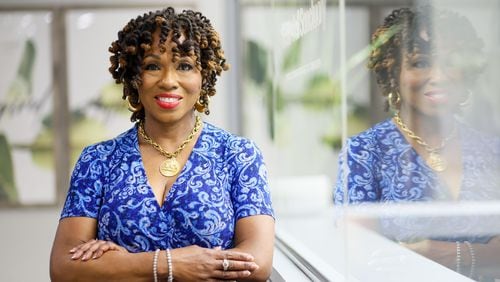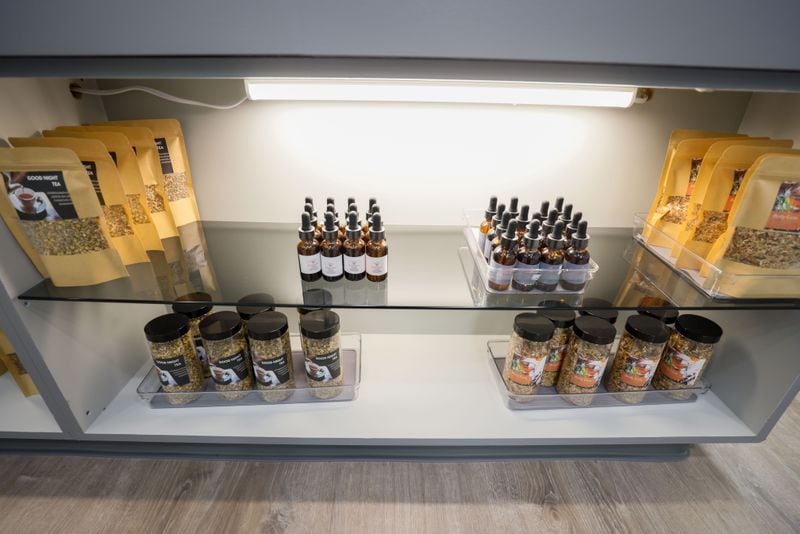The new Sickle Cell Sanctuary in Southwest Atlanta resembles a typical spa with its plush seating area, massage chairs, and glass display of essential oils and herbal teas.
The $1 million nonprofit holistic center inside the Sickle Cell Foundation of Georgia’s office building will offer relaxation techniques and supplemental health products, along with standard medical treatments, including hematology care, which involves the treatment of blood disorders.
Sickle cell disease patients in Atlanta will have access to free alternative therapy such as acupuncture and reflexology, complementing traditional medical approaches such as transplants they receive elsewhere to ease the pain they experience daily from the debilitating and life-threatening blood disorder.
The new wellness center, supported by public and private funds, is part of a growing trend of integrative medicine for pain management even as more traditional therapy comes on the market to treat the disease.
Georgia has one of the highest rates of sickle cell disease in the U.S. affecting about 16,000 people in the state, according to the Georgia Health Policy Center. There are about 100,000 patients nationwide with the disease — more than 90% from the Black community, the Centers for Disease Control and Prevention reports. The inherited genetic disorder results from red blood cells becoming hard and sticky, and getting stuck in small blood vessels, causing extreme pain and sometimes damaging organs.
Sickle cell disease is typically diagnosed at about 5 months of age when an infant may show signs of jaundice, fatigue and painful swelling of the hands and feet, according to the Cleveland Clinic. Bone marrow or stem cell transplants are the only known cures for the disease, but they carry serious side effects, including death, and not all patients have insurance to cover the procedure.
Atlanta sickle cell disease patients have long complained to the staff of the nonprofit Sickle Cell Foundation about the high cost of available treatments. They also can encounter long wait times at emergency rooms — often the only option for those without insurance — and their chronic pain is sometimes downplayed by medical providers as a ploy to receive opioids.
“Most of the time they are seen as drug seekers or not in pain by the physicians, nurses and healthcare professionals currently treating them,” said executive director Tabatha McGee. She discovered the benefits of holistic care after suffering a debilitating heart attack and stroke and wanted to bring the same services to sickle cell patients.
After it opens June 18, the Sickle Cell Sanctuary will offer free integrative health options known to reduce pain, such as acupuncture, massages, reflexology, psychotherapy, yoga, body measurement scans, herbal treatments, nutrition and fitness counseling, IV hydration and infusions. Hematology care for treating the blood disorder will include a physical exam, blood testing, and prescription for medication.
Credit: Miguel Martinez
Credit: Miguel Martinez
Sickle cell patients might not have otherwise been able to afford such services, McGee said, estimating the center will be able to treat 70 patients a day.
She was quick to point out that the holistic services are not intended to replace traditional care but supplement it. A medical director and team will oversee more traditional treatments and track outcomes, she added.
Northside Hospital hematologist-oncologist Lizamarie Bachier-Rodriguez said she sees the importance of pairing standardized medical care with holistic therapy to help sickle cell patients deal with the physical, psychosocial and mental health issues that come with the disease.
Traditional medicine — including pain medication, red blood cell transfusions, and in some cases, blood stem cell transplants — should still be used because of its scientifically and medically proven benefits, said Bachier-Rodriguez, an attending physician who works with the Blood and Marrow Transplant group associated with Northside’s Leukemia and Cell Therapy program.
“Sickle cell disease is a very medically complex disease.” Sickle cell patients don’t only deal with the physical pain of the disease, but the emotional trauma of a chronic illness that results in multiple visits to the emergency room and other medical complications,” she said. “From that perspective, anything that helps with their emotional well-being and does not take away from traditional medicine,” she said she supports.
The 7,350-square-foot Sickle Cell Sanctuary joins several new hospital-based holistic centers around the country providing integrative medicine services.
Credit: Miguel Martinez
Credit: Miguel Martinez
A report published recently in Frontiers in Pain Research found that holistic medicine offers hope for the diagnosis and treatment of acute and chronic pain in sickle cell disease. It is an alternative to drugs or other therapies that come with a risk of side effects or that don’t effectively treat people with the disorder.
The vast majority (88%) of patients treated at an integrative sickle cell disease program at Children’s National Hospital in Washington, D.C., reported having a positive experience without adverse effects, according to a 2021 study published in Complementary Therapies in Medicine. The program at Children’s National, one of the largest for sickle cell patients in the country, paired holistic medicine with standard care.
“Our experience suggests that encouraging conversations and offering safe and potentially effective integrative therapies alongside conventional sickle cell disease therapies under medical guidance allows patients to have an open discussion about their beliefs and treatment goals, improves patient satisfaction, and can improve outcomes,” study researchers reported.
In December, the Food and Drug Administration approved two gene therapies to treat the disease. But McGee said the treatment is expensive and patients the foundation serves typically don’t have health insurance to afford the hefty price tag.
She said the Sickle Cell Sanctuary is being funded from the state budget, administered by the Georgia Department of Public Health, along with private grants, partners, sponsorships and donations.
The wellness center expands upon the foundation’s other services for sickle cell disease. Those include a mobile health clinic that travels around rural Georgia providing hematology care to those who don’t have access to medical services. The foundation also offers sickle cell testing and counseling through a contract with DPH’s Newborn Screening Program, a week-long medically supervised overnight camp for children with the disease, a young adult retreat, services to help children transition from pediatric to adult care, and fundraising events.
In a few years, the foundation plans to also offer inpatient medical care at the center, with eight hospital beds and additional medical staff capable of administering blood transfusions and more traditional healthcare treatment. The foundation began to raise $2 million for that project, which would involve building a new facility, McGee said.
For more information about the Sickle Cell Sanctuary and to sign up for a tour during the grand opening, visit www.gawellness.com.
Sickle Cell Sanctuary Ground Opening
10 a.m. Tuesday, June 18, at Sickle Cell Foundation of Georgia, 2391 Benjamin E. Mays Drive, S.W., Atlanta
For more information on the Grand Opening of the Sickle Cell Sanctuary, call 404-755-1641 or visit www.gawellness.com









